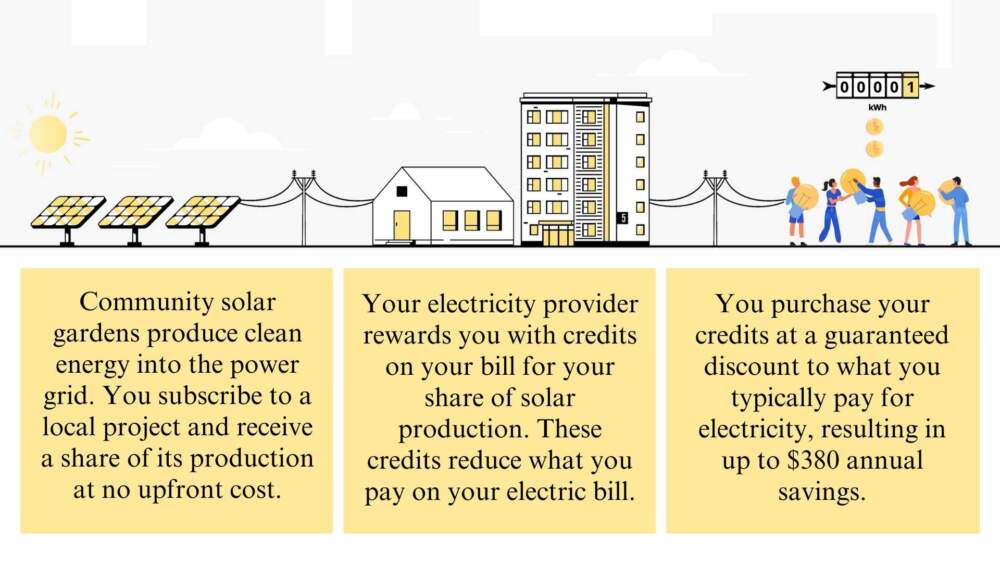Advertisement
Paid for by Solar Gardens by Syncarpha
Massachusetts electric bills set to rise this winter

This post was paid for and produced by our sponsor, Solar Gardens by Syncarpha, in collaboration with WBUR’s Business Partnerships team. WBUR’s editorial teams are independent of business teams and were not involved in the production of this post. For more information about Solar Gardens by Syncarpha, click here.
Residents of Massachusetts, particularly those served by National Grid and Eversource, have experienced roller-coaster electricity rates recently. Last year, an unexpected surge in the supply rate sent electric bills soaring, leaving many households grappling with higher costs. This summer, rates briefly dipped, offering some relief, but the looming winter months bring with them the expectation of yet another rate increase. Let’s delve into the reasons behind these fluctuations and what residential customers can anticipate as rates will climb once again this coming winter.
Lower Electricity Rates This Summer
This summer, residents in Massachusetts experienced a temporary dip in electricity rates. This respite was partly due to milder weather, which reduced the overall demand for electricity. Additionally, increased availability of renewable energy sources, such as solar and wind power, contributed to the decrease in rates during these months. However, these electric rates are likely to be short-lived.
Winter Rate Increase: Why?
As the cold weather returns, so do the concerns about rising electricity rates. There are several factors that contribute to this annual trend:
- Increased Demand: Winter in Massachusetts means higher electricity demand, primarily for heating purposes. As temperatures drop, households rely more on electric heating systems, which can significantly drive up electricity usage.
- Reduced Supply: The shorter days and less intense sunlight in winter lead to reduced electricity generation.
- Natural Gas Prices: Massachusetts and New England rely on natural gas for a substantial portion of its electricity generation. Due to the ripple effect of global natural gas price increases, these prices reverberate across the energy market, impacting electricity prices not only in Massachusetts but also in many parts of the world.
What To Expect When Rates Go Up
As rates rise in the coming winter months, residential customers should brace themselves for higher electricity bills. Rates might reach up to $0.25 per kilowatt-hour (kWh), which, while not as extreme as last winter, is still an increase over many recent years.
To put this into context, each household generates about 850 kWh every month based on a national average. At $0.25/kWh, this equates to an average electric bill of $212. Compare this with the current rate of about $0.14/kWh equating to $119.
What You Can Do To Prepare
Fluctuating electricity rates are an unfortunate reality for National Grid and Eversource customers in Massachusetts. While last year's rate hike was a shock, understanding the reasons behind these fluctuations and preparing for winter rate increases can help residents manage their energy costs effectively. By taking proactive steps to reduce energy consumption and exploring alternative energy sources, households can weather the storm of rising electricity rates with greater ease.
One innovative solution for managing your electricity costs, especially during periods of rate volatility, is to consider subscribing to a community solar garden for free. Community solar programs allow residents to lower their electricity costs by supporting local, renewable solar energy without the need for rooftop solar panels.
What is Community Solar?
Community solar allows you to subscribe to a shared solar project, often referred to as a solar garden or solar farm. These off-site solar projects generate clean electricity that is then distributed to the community by the local utility. As a result, subscribers receive a portion of that solar energy in the form of credits on their electric bill, reducing their electricity costs up to 10% annually.
This shared solar model can benefit millions of people who otherwise cannot install solar panels due to financial or property limitations. Solar Gardens by Syncarpha is a trusted community solar provider that is actively subscribing Massachusetts residents receiving electricity through National Grid and Eversource (Western MA).

About Solar Gardens
Solar Gardens is an industry-leading Community Solar program founded by Syncarpha Capital. Syncarpha started in 2009 with the goal of being developers and long-term owners of distributed renewable energy projects. Since then, Solar Gardens has worked closely with local developers, construction companies, electricians, and others to enable households and organizations to participate in the renewable energy movement without the need for rooftop installations. Our commitment extends beyond mere energy provision; we are dedicated to fostering environmental stewardship, enhancing energy resilience, and driving economic growth within the regions we serve.